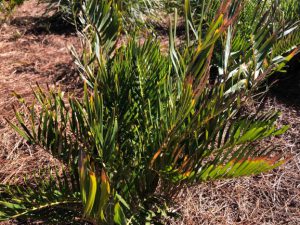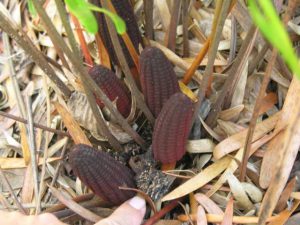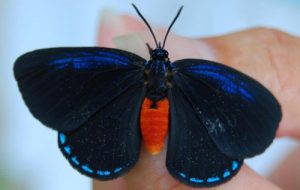
The ancient cycad, coontie, is a hardy and attractive plant for Florida landscapes. Photo credit: Carrie Stevenson, UF IFAS Extension
The plant has a crazy-sounding name, more like some little animal you’d find in Australia than a native plant. However, an ancient Florida plant it is, and a tough one at that. Growing close to the ground, it most resembles a large fern or a sago palm, if the sago had smooth, rounded leaf edges. Like the sago, the coontie (Zamia floridana) is a cycad—a group of palmlike plants that have been around so long that triceratops and stegasauruses ate them! Coonties are the only cycads native to North America, found in the states and island nations like Cuba and the Bahamas.

Male cones (strobilus) of coontie are thinner and shorter than female cones. Photo credit: Dan Culbert, UF IFAS
Another interesting feature of the coontie is its seed cones. These are large reddish orange cones that resemble magnolia seedpods. Both sexes of plant produce them in clusters ranging from one to five of the 2-7” long cones. Cones from the male produce pollen, while females produce seeds. If you are interested in attracting wildlife to your yard, the coontie provides good low-growing cover for birds and small mammals. It is also the preferred food for the caterpillar of the rare Atala butterfly. Members of the Timucuan and Calusa tribes ground up the starchy root of the coontie as a flour. However, the root contains a toxin and if it is not removed first, ingestion could result in severe abdominal pain and vomiting. From the late 1880’s through World War I, a large starch industry existed in Florida, producing flour from the coontie root.

Adult female atala butterfly, showing royal blue streak on forewings. Photo credit: Sandy Koi, University of Florida
At home in drier soil conditions like oak hammocks and pinelands in north central Florida, these plants can also adapt to a variety of soil pH types. Coonties are drought, cold, and salt tolerant, thus a great landscape choice for coastal landscapes near the Gulf or a bay. The plants are very long-lived and adaptable. In fact, the book Florida’s Best Native Landscape Plants notes it is “Very hardy and easy to care for. Will grow well in any part of Florida, even outside its normal range. An exceptional replacement for the closely related, often used, but non-native sago palm.” In other words, this is an ideal landscape plant that should be used more throughout Florida.
- Green Anoles - July 11, 2025
- The Praying Mantis - June 20, 2025
- Bluebirds in Florida - May 8, 2025
